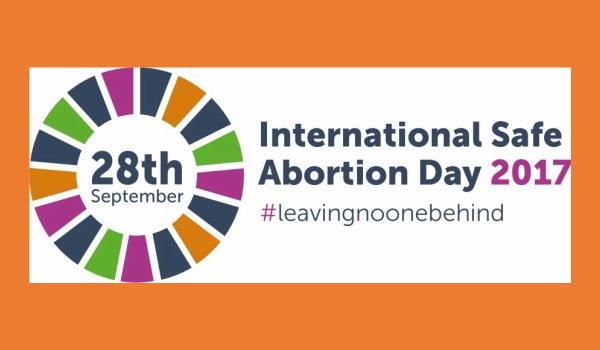
![]()
LA MESA, COLOMBIA
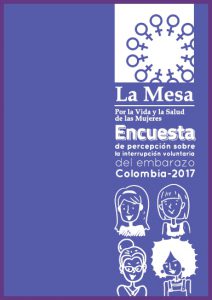
First national survey of the opinions of Colombians on legal abortion
Según revela la primera Encuesta de percepción sobre la interrupción voluntaria del embarazo en Colombia, de La Mesa por la Vida y la Salud de las Mujeres, el 65% de la población encuestada está de acuerdo con que la interrupción voluntaria del embarazo sea legal en las tres causales que dicta la Sentencia de la Corte Constitucional, C-355 de 2006. Los resultados se presentará en el marco del 28 de septiembre – Día de Acción Global por un Aborto Legal, Seguro y Gratuito. El estudio fue llevado a cabo por La Mesa por la Vida y la Salud de las Mujeres junto a la firma encuestadora Cifras y Conceptos, en las 32 ciudades capitales del país. Algunos de los temas a los que respondieron las y los participantes de la encuesta fueron: ¿Considera que la interrupción voluntaria del embarazo (en adelante, IVE) debe ser legal? ¿Las mujeres que decidan interrumpir voluntariamente su embarazo deben ir a la cárcel? ¿Qué tan importante es para usted que su candidato/a presidencial defienda los derechos de las mujeres?
(The results of the first national survey of the views of Colombians on the three grounds for abortion made legal in the judgment of the Constitutional Court, C-355 in 2006 were presented in the framework of the September 28 Global Day of Action for Legal, Safe and Free Abortion. The study was conducted by La Mesa por la Vida y la Salud de las Mujeres (Coalition for the Lives and Health of Women) in the 32 capital cities of the country.
Some of the questions that were asked in the survey were: do you consider that abortion should be legal? Do you think women who decide to voluntarily end their pregnancy should go to jail? How important is it to you that the candidate you support for president of the country defends the rights of women?)
********************************************************
WORLD HEALTH ORGANIZATION & GUTTMACHER INSTITUTE
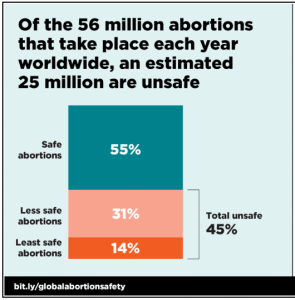
New study on safety of abortions
On International Safe Abortion Day, the World Health Organization and the Guttmacher Institute issued a new study on ‘Global, regional, and sub-regional classification of abortions by safety,
2010–14’. The new study, published in the Lancet, provides estimates on safe and unsafe abortions globally.For the first time, the study includes sub-classifications within the definition of “unsafe abortion” – less safe or least safe. The distinction allows for a more nuanced understanding of the different circumstances of abortions among women who are unable to access safe abortions from a trained provider.
When abortions are performed in accordance with WHO guidelines and standards, the risk of severe complications or death is negligible. Approximately 55% of all abortions from 2010 to 2014 were conducted safely, which means they were performed by a trained health worker using a WHO-recommended method appropriate to the pregnancy duration.
Almost one-third (31%) of abortions were “less safe,” meaning they were either performed by a trained provider using an unsafe or outdated method such as “sharp curettage”, or by an untrained person albeit using a safe method like misoprostol, a medication that can be used for many medical purposes, including to induce an abortion.
Only about 14% were “least safe” abortions – provided by untrained persons using dangerous methods, such as introduction of foreign objects and use of herbal concoctions. Deaths from complications of unsafe abortion were high in regions where most abortions happened in the least safe circumstances. Complications from “least-safe” abortions can include incomplete abortion (failure to remove all of the pregnancy tissue from the uterus); haemorrhage; vaginal, cervical and uterine injury; and infections.
*********************************************************
![]()
CROATIAN PLATFORM FOR REPRODUCTIVE RIGHTS
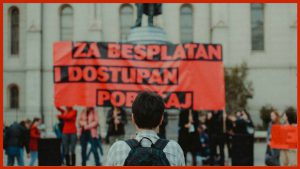
No more discussions about “when life begins” in Croatia
On 28 September, the Croatian Platform for Reproductive Rights demanded, loud and clear, not just safe and legal, but widely available and free abortion. Reproductive rights acknowledge the right of a woman to terminate her pregnancy but also to plan to become a parent. The politicization of reproductive rights means that women have to fight for free and quality public health and education, a sufficient number of public kindergartens and nurseries, safe workplaces and housing policies that take solidarity into account. The right to abortion cannot be secured by bringing just one legal frame because legal equality does not take into account uneven material preconditions that dictate whether a person will be able to practise that right. Unemployed women, women who have short-term contracts, women from rural areas, women with children without family and community support, women asylum seekers – they do not have a real choice; often they lack the money for abortion and also adequate conditions to raise their children. See photos from the protest in Zagreb here.
SOURCE: Udruga PaRiter, in Astra CEE Bulletin, No.10(168), 2017
********************************************************
SEX-ED TALK CAMPAIGN, ROMANIA
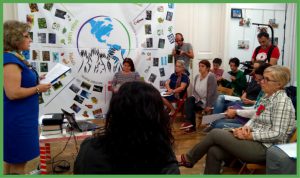
September 26th and 28th celebrations in Romania
Romanian ASTRA Network member Daniela Draghici of the Society for Feminist Analyses (AnA) organized and coordinated events for World Contraception Day, September 26, and International Safe Abortion Day, September 28, under the “SEXed Talk” Campaign, in partnership with the Society for Education in Contraception and Sexuality, Astra Youth, Youth for Youth Foundation, Romanian Anti-AIDS Foundation, Midwives’ Association and Marie Stopes International Foundation Romania.
At the Romanian Parliament on 26 September, Daniela interviewed Deputy Tudor Ciuhodaru, MD, Health Commission member, a promoter and supporter of health education legislation. They discussed the current status of sexuality education in schools (or rather lack thereof), the dramatic #1 position Romania holds in the European Union in number of teen pregnancies, abortions and abandoned babies, the lack of legislation and governmental strategy regarding reproductive health in general, and policymakers’ lack of interest in changing this situation for the better.
On 28 September, International Safe Abortion Day and also International Right to Know Day and International Day for Universal Access to Information, a debate took place on the issue of teen mothers and sexuality education, as part of the “SEXed Talk” campaign, at the Metropolitan Library in Bucharest. Parents, teachers, medical personnel, NGO representatives, policymakers, and media attended. The Youth for Youth volunteer coordinator presented their model of conducting sexuality education classes in high schools. A Midwives’ Association representative made a presentation on “Adolescent Pregnancy and Associated Risks”, and Ms. Clotilde Armand, Association for Democracy, who is running for mayor of Bucharest, advanced potential solutions to involve key medical and non-medical personnel in health education programmes in and out of schools.
On September 30th the young volunteers co-organized an outreach activity in the main park during the Bucharest City Festival and distributed lots of information materials, as well as condoms to young people . As a mother and AnA representative, Daniela gave a talk about parents’ responsibility in talking to their children about sexuality. These events were all recorded for a documentary on the cause and impact of lack of sexuality education and adolescent pregnancies in Romania.
SOURCE: Daniela Draghici, Report and Astra CEE Bulletin, No.10(168), 2017
********************************************************
WOMEN’S RESOURCE CENTER ARMENIA
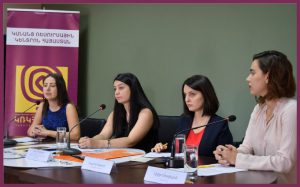
Press conference with local media and a working group
Women’s Resource Center Armenia initiated a press conference with local media to raise the issues for the Global Day of Action for Safe and Legal Abortion. A reproductive health and rights expert, a lawyer and a disability rights expert participated in the press conference. The main topic of concern was access to safe abortion for different groups of women, including women with disabilities and rural women. The experts raised the fact that many women in Armenia do not have access to safe abortion. In addition, the new mandatory “waiting period” created new challenges for the most marginalized women. The Women’s Resource Center Armenia also initiated a working group which will bring together different experts working in the field of reproductive health to raise different issues concerning reproductive health and rights affecting different groups of women.
SOURCE: Women’s Resource Center, in Astra CEE Bulletin, No.10(168), 2017. PHOTO: Media Centre
********************************************************
FORTRESS OF HOPE AFRICA & SAFE2CHOOSE, KENYA
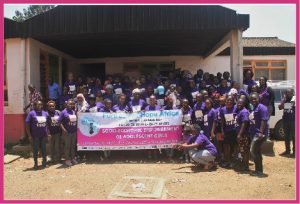
On International Safe Abortion Day, “we learned how to love ourselves”
On 28 September, safe2choose decided to join a smaller discussion group in Mathare, an informal settlement of Nairobi, Kenya, to understand the daily struggles faced by local women. The event was held in a simple school hall that was decorated with posters and signs displaying slogans such as “Stop rollbacks on our SRHR, funding saves lives“, that carried the #IResistWePersist hashtag, promoted by the Women’s Global Campaign for Reproductive Rights. It was an opportunity to witness first hand the incredible achievements of a local NGO, Fortress of Hope Africa, which has also joined safe2choose’s call to action to say why safe abortion must be available to all women worldwide.
FOHA is a well-established grassroots community project in the area that empowers young women about their sexual rights to make safe choices. They train groups of young women to be able to disseminate reproductive health information back within their community and be able to reach places that have no access to other kind of information. To guide the discussions, safe2choose.org, Howtouseabortionpill.org and Young Women Leadership Institute were invited to give presentations on safe abortion procedures and women’s rights. the audience, who were mostly eager to learn more about how to have a safe medical abortion, reasserting the need to provide more information on this subject. Before the event came to an end, the attendees also had a chance to speak. Everyone felt supported and felt like they belonged. A young mother perfectly summed it up: “Today, we learned how to love ourselves”.
********************************************************
PLAFAM, VENEZUELA
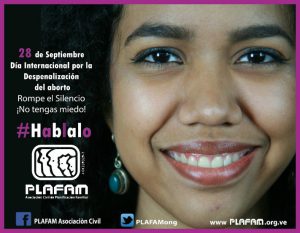
Hablalo!! Talk it over!!
Proyecto Hablalo (Talk It Over), a young people’s voluntary activity with PLAFAM, the IPPF member in Venezuela, held a rally for 28 September in a public space outdoors and encouraged passersby to attend by giving a talk on the importance of safe, legal abortion and contraception, the dangers of the restrictive abortion law in the country and the criminal punishments for abortion that exist in many Latin American countries. Passersby were encouraged to participate in creative activities, artwork, discussions and games, including a competition in which they could win condoms. The day also included public speeches, music and a short film. Participants were encouraged to sign a petition calling for safe abortion. PLAFAM feels it is important to pay particular attention to encouraging adolescents and young people to join in activities, in order to promote an open discussion on abortion and to break the silence and stigma that surrounds abortion in Venezuela.
********************************************************
@yourrepealers, IRELAND
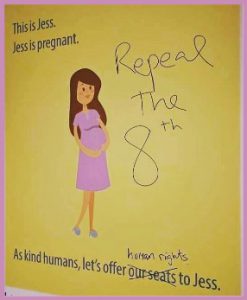
An Irish supporter of Repeal the 8th started the #KnowYourRepealers hashtag to illustrate the diversity of Irish women supporting #Repealthe8th. Following its success, a new Twitter account – @yourrepealers – was launched where supporters are telling their stories. Really worth reading!
***************************************************
SOUTH KOREA
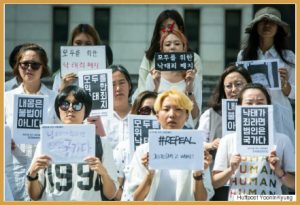
![]()
We believe this article in the Huff Post Korea, dated 28 Sept, is about International Safe Abortion Day, because of the hashtag #repeal in this photo.
***************************************************
GIWYN, NIGERIA

Report of their activities, see http://www.safeabortionwomensright.org/nigeria-giwyn-and-nacsaa/



